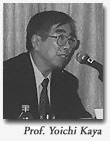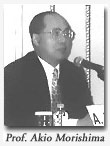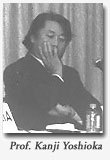 |
| Newsletter |
|
GISPRI No. 17, 1999
|
||
|
||
|
GISPRI Symposium 1998 Global Order in 21st Century - Roles of Markets, Nations, and the International Community December 2nd, 1998, at the Diamond Hotel in Tokyo. < Session 1 > Sustainable development and the way of international community Keynote Lecture Presented by Prof. Yoichi Kaya of Keio University
Prof. Kaya first introduced two concepts on sustainability: one was the sustainable development represented in the 1987 report of the United Nation's Brundtland Commission entitled, "Our Common Future". The basic concept was that environmental conservation and economic development would not counteract each other. Many others argued that they would indeed counteract each other, most typically represented in that famous Roman Club report published in 1972 called "Limit to Growth". This book proposed that for the sake of sustainability, human society should abandon economic growth and to halt population growth. Each of these concepts had its own reasoning. The UN report pointed out the need to realize both environmental conservation and economic growth, while the Roman Club's concept on the civilization sustainability suggested that various civilization activities seemed to exceed the natural capacity of the Earth. Global warming is one such human activity and the symbol of argument on environmental conservation vs. economic growth as it continues to relate to the broader range of the sustainability issue. Prof. Kaya indicated that we need to search for an answer that will satisfy both. His suggestion for realizing such a balance was that developed countries would adopt strategies to drastically reduce their physical consumption using whatever methods required. Unless the developed countries could demonstrate such efforts, he argued, there would be no solution to the problem. On the other hand, developing countries would need to take a growth path different from the path developed countries took. This would require leap-frogging. Developing countries were to leap-frog to advanced technologies, and realize the efficient uses of energy and resources, without having to repeat the path taken by developed countries. This would require the well-coordinated cooperation of developed countries, and their offers of appropriate technologies. Prof. Kaya then indicated several case studies on the subject. Using the case of combined cycle power generation with natural gas, he emphasized that it would be more preferable to let developing countries adopt the combination of technologies for energy uses. There would be a limit, as well as a challenge, to apply such modern technology to developing countries. It would also be necessary to coordinate the stocks of conventional technologies in developing countries with the introduction of advanced technologies. The presence of existing facilities might not easily allow leap-frogging to a new set of advanced facilities. In such a case, technologies that could bridge the gap between the old conventional technologies to new, advanced technologies would be increasingly important. Prof. Kaya suggested that the task of developed countries would be to use more natural energy sources to reduce consumption drastically, and to adopt extensive restructuring of systems. In his opinion, more focus should be directed toward the accumulated effects of such actions in various fields. Even with significant technological breakthroughs, their effects would not take place for a few decades. Yet, developing such technologies today would direct us to a better future in the long run.
Commentation
and Discussion:
Prof. Akio Morishima of Sophia University
Prof. Morishima addressed the entwining of global warming problems with global environmental problems, and focused on global warming problems from a perspective of a broader concept called sustainable development. He discussed the negotiation at the COP4 in Buenos Aires, and stressed the importance of developing country participation. First, he suggested that, as the condition for encouraging developing country participation in the regime of global warming mitigation, developed countries would need to adopt clear emission reduction policies and drastically reduce energy consumption. His second suggestion was for the need to gradually increase the flow of new and additional technologies and funds to developing countries, and keep both developed and developing countries in cooperatively pursuing certain technology development or technology improvements. He emphasized, "It will be necessary to position the contribution of each country within the framework of CDM. Technology transfer requires some incentives, so it will be important to build a meaningful system for Japan to contribute within the international framework of CDM". Prof. Kanji Yoshioka of Keio University
Prof. Yoshioka emphasized the importance of developing an economic mechanism that could provide merits of supporting technology development at a reasonable cost. He indicated that the fundamental tasks of the international community was in establishing a system to control and manage global common wealth in the environmental rights. He also stressed the importance of developing country participation in terms of leakage problems and considered the enormity of the tasks. He suggested that there had been insufficient discussion on how developing countries would participate, and whether their participation would provide benefits to them, since their non-participation would cause some losses. Prof. Yoshioka's third suggestion was that, in the discussion on whether environmental conservation and economic development would trade-off each other or not, it would be better to integrate the developing country participation problems with the bottoming up of developing countries with two wheels, a wheel of economic growth and a wheel of environmental conservation. Problems
of China and Developing Countries
Dr. Zhou explained the difficult problems China faces: first, the problem of water deficiency; second, the poverty; and third, environmental problems. First of all, there is the environmental problem of water pollution. Water deficiency is one of China's most serious problems, which further exacerbates water pollution problems. Then, there is the new environmental problem of waste treatment. In addition, China had many other difficult problems such as desertification and ecosystem destruction, and, on top of them, there is the climate change issue. He explained about several simulations conducted in China on the global warming issue. As Global Warming measures, China first took on the economic growth control, the measure which was no longer applied. The second measure was population control. The third was the measure relating to control technologies, such as emission control using energy saving, efficiency improvement, fuel switching, non-fossil energy introduction, an increase in carbon sink, and exhaust gas treatment for environmental degradation measures. These were not originally designed for reducing CO2, but for economic effects and SO2 reduction. Nonetheless, they also led to CO2 reduction, as well. Prof. Zhou maintained that such measures could be a way of connecting developed and developing countries in global warming issues. He introduced one case study. The coal-fueled thermal power plant in Dalian used technology transferred from Japan. If all other thermal power plants in China would have energy efficiency as good as the Dalian plant, China could save 95 million tons of coal and reduce CO2 emissions close to 65 million carbon equivalent tons. The problem arises as to what to do with other thermal power plants and how to procure funds to renovate these existing plants. Another problem would be that those existing plants have not been equipped with desulfurization systems. Regarding the developing country participation problem in global warming, he suggested that developed countries should take strong initiatives to reduce emissions in consideration of their capacities, and demonstrate a role model for future measures. Second, despite developed countries' urging CO2 emission control in developing countries, controlling CO2 emission only would not be attractive enough for developing countries. Prof. Zhou indicated that it would be necessary to support measures that would produce mutually beneficial effects. Examples of such measures include coal utilization technology for thermal power plants, and technology cooperation in nuclear power plants, as well as in economic system development. Even for joint venture projects, it would be necessary, from now on, to integrate environmental benefits in project planning that provide a mutually beneficial system that would bring economic and environmental benefits to both parties. Examples of such measures include CDM and Joint Implementation. It is important to make these systems readily acceptable to both parties. Otherwise, he emphasized, the expected results would never materialize. Prof. Kaya Prof. Kaya discussed Japanユs activities in technology transfers to China, including coal-related technologies that could address the problems of the high cost of desulfurization equipment and water deficient localities. Examples of such technologies are dry and semi-dry desulfurization, and simpler desulfurization equipment. Another technology transfer activity is the advanced coal cleaning technology that can simultaneously address the problems of energy efficiency improvement and environmental conservation. Prof. Kaya suggested that, aside from coal as prominent energy source, China should focus on natural gas as energy source in a long term perspective. Considering the enormity of tasks to switch fuels, he emphasized the need for a thorough discussion on how to proceed with the fuel switching to natural gas, including the possibility of cooperation from developed countries. He also suggested the shift in Chinese policy-making from the conventional "no regret" policy making to "minimum regret" policy-making. Prof. Morishima Prof. Morishima talked about the revision of China's Air Pollution Prevention Act. The Act required power plants to install desulfurization equipment, but the requirement was hardly complied in rural areas. The Act's functions have not been effectively realized in terms of pollution penalty charges. It would require political wills and an appropriate supporting system to make this Act effective. Simply legislating a law would not be sufficient. The wills to enact the law would be essential. Prof. Morishima stressed the need to conduct further study and review in China and Japan, including the kind of discussion in the Symposium, which would be another form of a cooperation. Prof. Yoshioka Prof. Yoshioka pointed out that the Chinese side actively proceeded with serious talks on joint venture in the area Chinese side would consider useful. The Japanese side, however, was extremely cautious about such talks for fear of letting Chinese side take advantage. He suggested that the Chinese side seemed to act more positively in various matters. China would need to increase local production of commodities, since the products manufactured by transferred technologies, such as those from Japan, might not necessarily fit the size and quantities in demand in China. He emphasized that there were plentiful problems in this area. |
||
|
|




